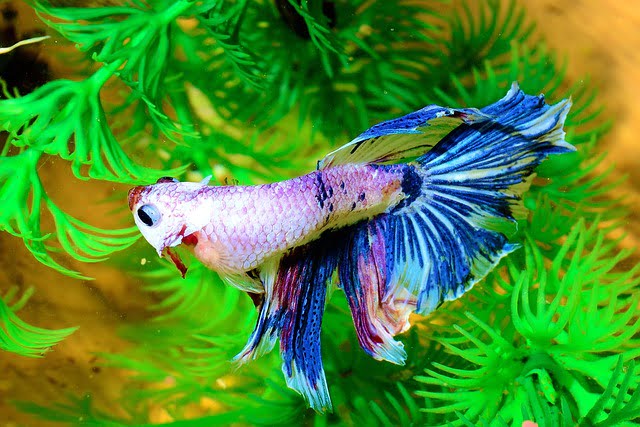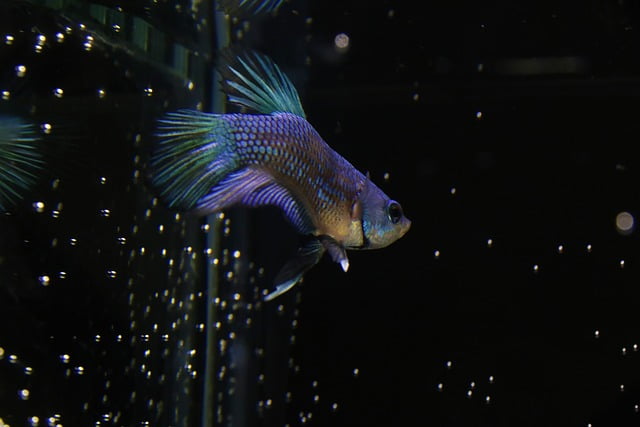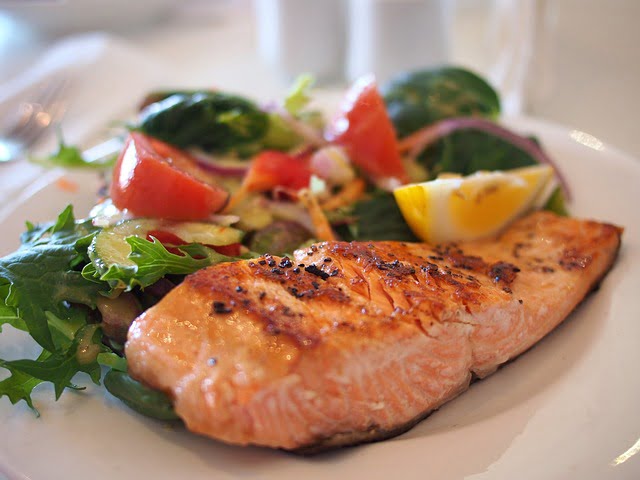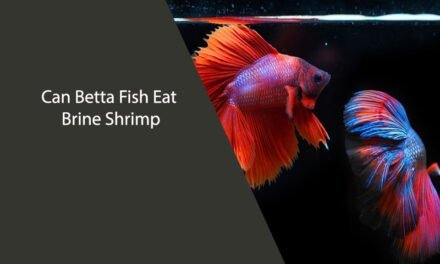Betta fish are known for their vibrant colors and long flowing fins, making them a popular choice for aquarium enthusiasts. As with any pet, owners want to ensure that their betta fish are well-fed and healthy. One question that often arises is whether betta fish can eat human food. In this article, we will explore this topic and provide a clear answer.
First, it is important to note that betta fish are carnivorous and require a high protein diet. While they primarily eat insects and small crustaceans in the wild, they can also eat certain types of fish food such as pellets and flakes. However, not all human food is suitable for betta fish consumption. Some foods can be harmful and even toxic to them.
So, can betta fish eat any human food? The answer is no. While some human foods may be safe for betta fish to eat, it is important to research and consult with a veterinarian or aquatic specialist before introducing any new foods into their diet. In the next section, we will go over some human foods that betta fish can and cannot eat.

Table of Contents
Understanding Betta Fish Diet
Betta fish are carnivorous and require a diet that is high in protein. In their natural habitat, they feed on insects, larvae, and small crustaceans. Therefore, it is essential to provide them with a diet that replicates their natural diet to keep them healthy and happy.
Feeding your betta fish a balanced diet is crucial to ensure they receive all the necessary nutrients. Overfeeding or feeding them the wrong food can lead to health problems, including constipation, bloating, and swim bladder disorder.
Here are some tips to help you understand the betta fish diet:
- Betta fish require a high-protein diet, so it is essential to feed them food that contains at least 40% protein.
- Pellets and flakes are the most common types of betta fish food available in the market. It is recommended to choose high-quality pellets that contain all the necessary nutrients.
- Freeze-dried or frozen foods, such as bloodworms, brine shrimp, and daphnia, can be given as a treat. However, it is essential to ensure that they are free from harmful bacteria and parasites.
- Betta fish should not be fed human food, as it can lead to health problems. Foods such as bread, pasta, and cheese are not suitable for betta fish as they are high in carbohydrates and can cause bloating and constipation.
In conclusion, understanding the betta fish diet is crucial to keep them healthy and happy. Feeding them a balanced diet that replicates their natural diet and avoiding human food can help prevent health problems.
Common Human Foods for Betta Fish
Betta fish are omnivores, which means they can eat both animal and plant-based foods. Although it is important to provide them with a balanced diet of high-quality fish food, you may also wonder if you can feed them some of your own food. Here are a few common human foods that betta fish can safely eat in moderation.
Cooked Peas
Peas are a great source of fiber and vitamins for betta fish. To feed them cooked peas, simply boil them until they are soft and then remove the outer skin. Cut the peas into small pieces and feed them to your betta fish. Peas can help with digestion and can also prevent constipation.
Boiled Spinach
Spinach is another nutritious vegetable that betta fish can eat. It is rich in vitamins and minerals, including iron and calcium. To feed your betta fish boiled spinach, simply boil it until it is soft and then cut it into small pieces. Spinach can be a great addition to your betta fish’s diet, but it should be fed in moderation as it contains oxalic acid which can interfere with calcium absorption.
Cucumber Slices
Cucumber is a refreshing and hydrating vegetable that can also be fed to betta fish. To feed your betta fish cucumber, simply cut it into thin slices and remove the seeds. Cucumber is low in calories and a good source of vitamins and minerals. It can also help with hydration and can be especially beneficial during hot weather.
Remember that while it is safe to feed your betta fish some human foods, it is important to do so in moderation and as a supplement to their regular diet. Always avoid feeding them foods that are high in salt, sugar, or fat, as well as any toxic foods such as chocolate or avocado.
Why Some Human Foods are Unsafe
When it comes to feeding Betta fish, it’s essential to stick to their natural diet. While Bettas can eat some human foods, not all of them are safe. In this section, we’ll go over some of the human foods that are unsafe for Bettas.
Processed Foods
Processed foods are often high in salt, preservatives, and other additives that can be harmful to Bettas. These foods can also cause digestive issues and lead to obesity, which can be fatal for Bettas. Some examples of processed foods that are unsafe for Bettas include:
- Chips
- Crackers
- Pretzels
- Fast Food
- Frozen Dinners
Sugary Foods
Sugary foods can cause a variety of health problems for Bettas, including obesity, diabetes, and tooth decay. These foods can also disrupt the natural balance of bacteria in the Betta’s digestive system. Some examples of sugary foods that are unsafe for Bettas include:
- Candy
- Chocolate
- Cake
- Cookies
- Ice Cream
Spicy Foods
Spicy foods can cause digestive issues for Bettas, including stomach upset and diarrhea. Additionally, some spices can be toxic to Bettas in large quantities. Some examples of spicy foods that are unsafe for Bettas include:
- Hot Sauce
- Curry
- Chili Powder
- Garlic
- Onion
Overall, it’s best to avoid feeding your Betta any human food that isn’t specifically recommended for them. Stick to their natural diet of high-protein foods like pellets and live or frozen foods like brine shrimp and bloodworms.

The Role of Commercial Betta Fish Food
Commercial betta fish food is specifically formulated to meet the nutritional needs of betta fish. It is the best option for providing your betta with a balanced and complete diet.
Most commercial betta fish food comes in the form of pellets, flakes, or freeze-dried foods. These foods are made from a variety of ingredients, including fish meal, shrimp, and krill. They also contain added vitamins and minerals to ensure that your betta receives all the nutrients it needs to stay healthy.
One of the advantages of using commercial betta fish food is that it is convenient and easy to use. You can simply feed your betta fish a small amount of food once or twice a day, depending on its size and age.
Another advantage of commercial betta fish food is that it is formulated to meet the specific dietary needs of betta fish. Betta fish require a high-protein diet, and commercial betta fish food is designed to provide this protein in the form of fish meal and other sources.
It is important to note that while betta fish can eat some human foods, such as boiled vegetables and small amounts of cooked meat, these should not be relied upon as the sole source of nutrition for your betta. Commercial betta fish food is the best option for providing your betta with a balanced and complete diet.
The Importance of Dietary Variety
As responsible Betta fish owners, we want to ensure that our pets are receiving a balanced and nutritious diet. While Betta fish are primarily carnivorous and require a diet high in protein, it is important to also incorporate a variety of other foods into their diet.
Providing a diverse diet not only ensures that our Betta fish receive all the necessary nutrients, but it also helps to prevent boredom and provides mental stimulation. Eating the same food every day can become monotonous and can lead to a lack of interest in food, which can ultimately lead to malnourishment.
Incorporating different types of food such as live or frozen foods, vegetables, and fruits can also provide additional health benefits. For example, feeding Betta fish live or frozen brine shrimp can help improve their digestion and boost their immune system. Vegetables such as peas can aid in digestion and help prevent constipation. Fruits such as strawberries and blueberries are high in antioxidants, which can help fight against disease and improve overall health.
However, it is important to note that not all human foods are suitable for Betta fish. Some foods can be toxic and even fatal to our pets. It is important to do research and consult with a veterinarian or experienced Betta fish owner before introducing any new foods into their diet.
In conclusion, providing a diverse and balanced diet for our Betta fish is crucial for their overall health and well-being. By incorporating a variety of different foods, we can ensure that our pets receive all the necessary nutrients and stay healthy and happy.
Risks of Feeding Human Food to Betta Fish
Feeding human food to betta fish may seem like a good idea, but it can be harmful to their health. Some human foods can cause digestive problems, while others can be toxic. Here are some of the risks of feeding human food to betta fish:
- Digestive problems: Betta fish have a delicate digestive system, and some human foods can cause bloating, constipation, or diarrhea. Foods that are high in fat, salt, or sugar can be especially problematic. Some examples of human foods that can cause digestive problems in betta fish include bread, cheese, chips, and candy.
- Toxicity: Some human foods can be toxic to betta fish, even in small amounts. Foods that are high in caffeine, alcohol, or theobromine can be especially dangerous. Some examples of human foods that can be toxic to betta fish include coffee, tea, chocolate, and alcohol.
- Nutritional deficiencies: Betta fish have specific nutritional requirements, and feeding them human food can lead to nutritional deficiencies. Human food is often lacking in essential vitamins and minerals that betta fish need to stay healthy. Some examples of human foods that are not suitable for betta fish include bread, pasta, and rice.
In conclusion, feeding human food to betta fish can be risky and should be avoided. Instead, it is best to feed them a high-quality betta fish food that is specifically formulated to meet their nutritional needs. This will help ensure that they stay healthy and happy for years to come.
Conclusion
In conclusion, betta fish can eat some human foods, but it’s important to be cautious about what we feed them. While some foods can provide necessary nutrients, others can be harmful or even deadly.
We recommend sticking to high-quality betta fish food that is specifically formulated to meet their nutritional needs. However, if you do want to supplement their diet with human food, make sure to do so in moderation and only offer foods that are safe for them to eat.
Some of the best human foods for betta fish include:
- Cooked peas
- Daphnia
- Brine shrimp
- Bloodworms
- Small pieces of cooked fish or chicken
On the other hand, there are many human foods that should be avoided, including:
- Processed foods
- Spicy foods
- Citrus fruits
- Chocolate
- Dairy products
By being mindful of what we feed our betta fish, we can help ensure that they live long, healthy lives. Remember to always do your research and consult with a veterinarian or fish expert if you’re unsure about whether or not a certain food is safe for your betta fish to eat.

Frequently Asked Questions
What vegetables are safe for Betta fish to eat?
Betta fish can eat a variety of vegetables, but it is important to ensure that they are safe for them. Some safe vegetables for Betta fish include blanched peas, zucchini, and spinach. It is important to note that vegetables should be chopped into small pieces to prevent choking and overfeeding.
What is the best food for Betta fish?
The best food for Betta fish is a high-quality pellet or flake food specifically formulated for Betta fish. These foods provide all the necessary nutrients for a healthy diet. It is important to avoid overfeeding and to provide a varied diet that includes occasional treats such as frozen or live brine shrimp.
Can Betta fish eat homemade food?
While it is possible to make homemade food for Betta fish, it can be difficult to ensure that the food provides all the necessary nutrients. It is important to consult with a veterinarian or a knowledgeable fish expert before feeding homemade food to Betta fish.
Can Betta fish eat cucumber or lettuce?
Betta fish can eat cucumber or lettuce, but it is important to remove the skin and seeds from the cucumber and to ensure that the lettuce is free from any dressing or seasoning. These vegetables should only be given as an occasional treat and should not replace the Betta fish’s regular diet.
Are brine shrimp or bloodworms good for Betta fish?
Brine shrimp and bloodworms are a good source of protein for Betta fish and can be given as an occasional treat. However, they should not replace the Betta fish’s regular diet and should only be given in small amounts.
Is it safe for Betta fish to eat bananas or apples?
Betta fish should not be fed bananas or apples as they are not part of their natural diet and can be difficult for them to digest. It is important to stick to foods that are specifically formulated for Betta fish to ensure that they receive all the necessary nutrients for a healthy diet.





